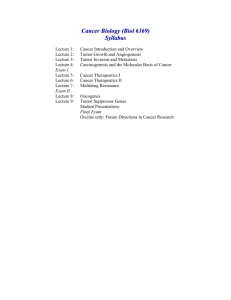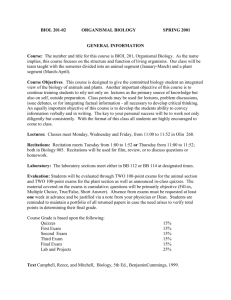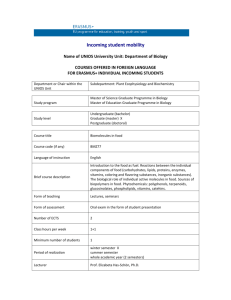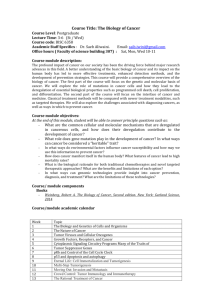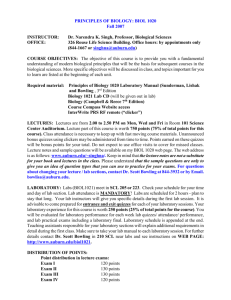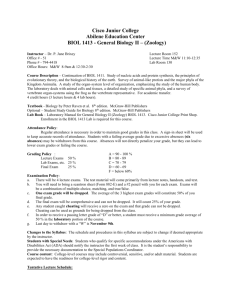1 Syllabus: Introduction to Biology of Cancer. BIOL F492
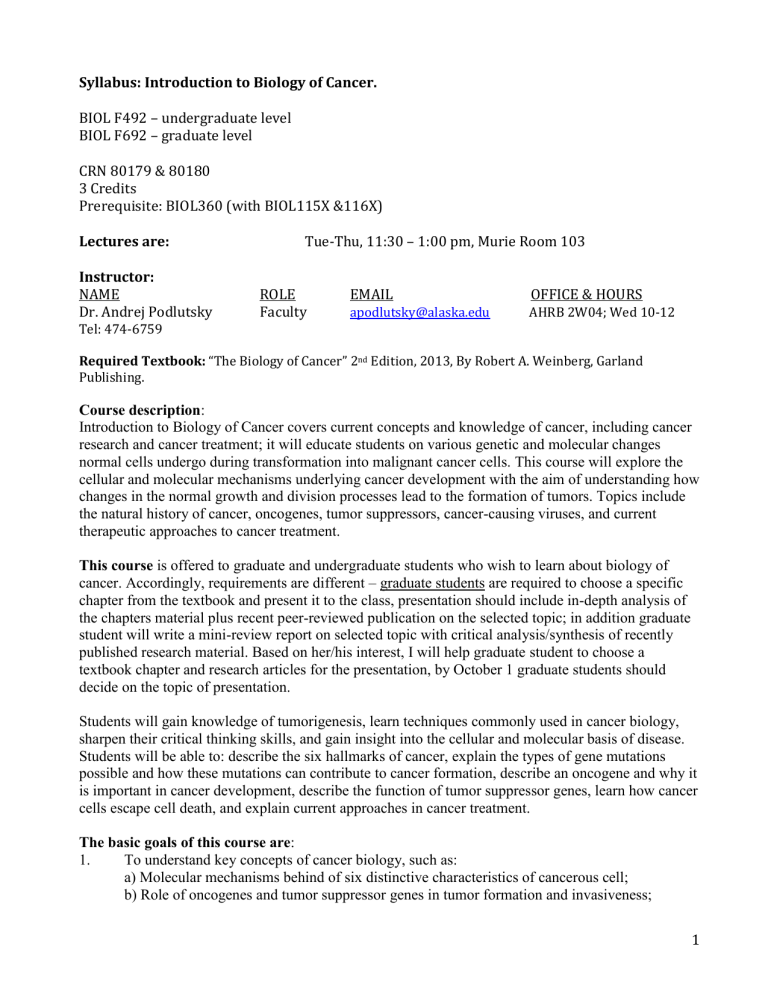
Syllabus: Introduction to Biology of Cancer.
BIOL F492 – undergraduate level
BIOL F692 – graduate level
CRN 80179 & 80180
3 Credits
Prerequisite: BIOL360 (with BIOL115X &116X)
Lectures are:
Instructor:
NAME
Dr. Andrej Podlutsky
Tel: 474-6759
ROLE
Faculty
Tue-Thu, 11:30 – 1:00 pm, Murie Room 103
EMAIL OFFICE & HOURS apodlutsky@alaska.edu
AHRB 2W04; Wed 10-12
Required Textbook: “The Biology of Cancer” 2 nd Edition, 2013, By Robert A. Weinberg, Garland
Publishing.
Course description :
Introduction to Biology of Cancer covers current concepts and knowledge of cancer, including cancer research and cancer treatment; it will educate students on various genetic and molecular changes normal cells undergo during transformation into malignant cancer cells. This course will explore the cellular and molecular mechanisms underlying cancer development with the aim of understanding how changes in the normal growth and division processes lead to the formation of tumors. Topics include the natural history of cancer, oncogenes, tumor suppressors, cancer-causing viruses, and current therapeutic approaches to cancer treatment.
This course is offered to graduate and undergraduate students who wish to learn about biology of cancer. Accordingly, requirements are different – graduate students are required to choose a specific chapter from the textbook and present it to the class, presentation should include in-depth analysis of the chapters material plus recent peer-reviewed publication on the selected topic; in addition graduate student will write a mini-review report on selected topic with critical analysis/synthesis of recently published research material. Based on her/his interest, I will help graduate student to choose a textbook chapter and research articles for the presentation, by October 1 graduate students should decide on the topic of presentation.
Students will gain knowledge of tumorigenesis, learn techniques commonly used in cancer biology, sharpen their critical thinking skills, and gain insight into the cellular and molecular basis of disease.
Students will be able to: describe the six hallmarks of cancer, explain the types of gene mutations possible and how these mutations can contribute to cancer formation, describe an oncogene and why it is important in cancer development, describe the function of tumor suppressor genes, learn how cancer cells escape cell death, and explain current approaches in cancer treatment.
The basic goals of this course are :
1. To understand key concepts of cancer biology, such as: a) Molecular mechanisms behind of six distinctive characteristics of cancerous cell; b) Role of oncogenes and tumor suppressor genes in tumor formation and invasiveness;
1
c) The integration of basic scientific knowledge into medical research and treatment protocols.
2. To contribute to a student-centered interactive learning environment. A substantial proportion of the content of the course will be presented and chosen by students.
3. To work effectively with others. This includes teamwork to prepare for lectures and presentations, participation in group discussion and peer evaluation.
We will use a variety of approaches to achieve these goals:
1. Lecture and discussion. In lecture, we are going to talk about the basic concepts in neurobiology. An important source for this information is from written material including, but not limited to, Robert A. Weinberg, The Biology of Cancer, 2 nd Edition, 2013, By Garland Publishing.
Quizzes will test your knowledge of the lecture material, and material in the text not covered in lecture. So you need access to the text material.
2. Student-led lectures (Biol 492 and 692). Presentation of lecture material by students is one of the best learning tools for the presenters as well as the listeners. Students will give one 15-minute lecture presentations. Presentation: Based on topic selected from the text. A group of 3 students will select material assigned for a particular class. Students will divide the material, and each will present a portion of that material as an individual presentation. Group presentations are not acceptable.
3. A written mini-review on a topic in the biology of cancer of your choice (BIOL692). This is an individual project on a topic of your choice.
For the BIOL 492 undergraduate part of this course basic goals are: the ability of student to analyze, compare and contrast, material presented in textbook and lectures, show ability to apply course material to solving complex cancer-related problems, which require a substantial background of knowledge of molecular and cellular biology.
For the BIOL 692 graduate part of this course basic goals are: the ability of student to do rigorous analysis and synthesis of basic ideas and approaches used for studying tumors in biomedical labs.
Following successful completion of this course students will be able to show independent thinking skills and ability to defend/critique certain new or established approach in cancer’s treatment and therapy development.
Instructional methods : This course will be taught through a combination of lectures, group problem solving, and student-led presentations/discussions.
Policies : Class attendance is required. Classes will start and end on time; you are expected to be on time. If for any reason you are not able to attend a specific class meeting, you will be responsible for catching up with the material covered during the absence. If you are required to participate in either (a) military or (b) UAF-required activities that will cause you to miss class, you must notify me as soon as possible before your absence. Tardiness, absenteeism, inattentiveness, and unfamiliarity with course material will all negatively impact this subjective assessment. Note that UAF policy provides a mechanism for an instructor to unilaterally withdraw a student from any course. Chronic absenteeism will be grounds for such action, at the discretion of the instructor.
You are responsible for any material covered if absent from class regardless of the reason.
Notes must be obtained from classmates.
2
I will be more than happy to help clarify material missed during any absence, but it must be during my office hours or another time outside of class that is convenient for both of us and you must be prepared
(you must have read and thought about the material before meeting with me).
Electronic devices: during lectures – please refrain from using any device in the class that might disrupt the lecture or your colleagues. This includes, but not limited to: cell phones, pagers, PDA, iPods (you get the idea).
Exams: Exams will be based on material covered in lectures, textbook and other readings. You are expected to take all exams at the scheduled time. Check the schedule carefully and plan your appointments and travel around the course schedule. In particular, make sure you schedule your travel plans for break after the final exam. I will not grant requests for early finals to accommodate early travel. Exams will contain multiple choice and short answer items.
Scheduled absences: For absences caused by conflict with a University-sanctioned activity
(e.g., participation in a competition as a UAF athlete), you must notify me in advance of the exam.
You will be expected to take the exam before your absence. Other types of scheduled absence are generally not accepted; you are expected to schedule around the exams.
Unscheduled (emergency) absences: If an emergency arises (ie: family death, medical emergency) the day of the exam that makes you unable to attend the exam, you must inform me before the start of the exam by e-mail or phone (leave a message if you can’t reach me). You must take a make-up exam within 48 hours of the scheduled exam. It is your responsibility to schedule the makeup. If not taken within 48 hours, the exam will be recorded as a zero. You should expect to provide documentation of the emergency. Make-up exams are not guaranteed; they are granted at the instructor’s discretion.
Blackboard: Slides used in lecture will be posted on Blackboard prior to/or after the lecture. Please do not use these as a substitute for taking notes. The slides will contain mostly figures, illustrating many of the complex processes we will be discussing during class. I use minimal text on slides and strongly encourage you to take notes to enhance your understanding and learning of the material. Note taking is a skill that requires practice to master, and is essential for learning.
I also use Blackboard to post announcements, exam and homework keys, and any other interesting tidbits. Please check out the BB site on a regular basis. I also use the UAF email accounts to contact students. Please check your UAF account on regular basis. If you use an alternate account, please have your UAF mail forwarded to that account.
Email Etiquette: I will do my best to respond to your email inquiries within 24 hrs. Please be considerate in your letters and use proper English grammar. Think before you send and never write anything you would feel uncomfortable saying to me (or anyone else!) in person. Please sign your letter; addresses don’t always reveal the identity of the writer. I do not accept any assignment via email.
Disabilities : I will work with the Office of Disabilities Service (Whitaker Building, Room 208, Tel:
(907) 474-5665) to provide accommodations and equal access to all materials in this course to all students.
Grading : Your final grades will be based on the following:
3
(1) Exams (450 points) : There will be four exams during the semester, one of which is the final exam. Each exam will count for 100 points (300 points total). The final exam (150 points) will be cumulative. The questions at the end of each chapter are an excellent study guide. I strongly suggest that you test yourself with these questions after reading each chapter. Twenty points from each exam will be in the form of take-home questions in which you apply the knowledge you learn in class to solve problems. During exams (exception - Final Exam) students are allowed to use their hand-written notes, because of this - taking good notes during class lectures and presentations is very important. Each exam will contain “take-home” part (usually
15-20% of exam grade); graduate students are expected to search NCBI
(http://www.ncbi.nlm.nih.gov/pubmed) for the recent research article and provide answer based on gained information.
(2) Current topics in the biology of cancer presentation (75 points): These presentations are an opportunity for us all to learn more about current issues in cancer biology. I will provide one background article to get you started. You will need to research additional material for your presentation. Undergraduate students: you will work in groups of three, and you can divide the work in any way you choose, however each of you must speak an equivalent length of time.
The presentations should be approximately 45 minutes in length (total), so you can estimate
~15 min. per person. Graduate students: will do their presentation alone, length of presentation
30 minutes, use of research articles required. Presentation should include sufficient background information on the topic and then cover any controversies related to the topic, including both sides of any argument. For example, in relation to BRCA1, there are some people who are being tested for the presence of a mutation in this gene and then getting mastectomies if they are carriers, regardless of whether or not they have cancer. Do you think this is a good idea, why or why not? Is genetic testing in general a good idea? Everyone must let me know by
September 15 which topic they will be working on. Once your groups have been established, I would like to meet with each group to help plan your presentation. You may use either
PowerPoint slides or overheads for your presentation.
(3) Report (75 points, BIOL692 only): you will write an 8-page report (line spacing: single) on the one of recommended topics, which is related to current research in cancer (reference list should contains at least 10 citations). I will provide rubrics for the report. Graduate students are expected to write a mini-review style report containing critical analysis and synthesis based on covered materials and published research articles. Reports are due on December 1 by noon, and should be uploaded to BB, link will be provided. No late reports are accepted.
(4) Homework (5 x 15 = 75 points): during the course I will give you a home work assignments, which could be related to the material covered in lectures, discussed in class, or related to the newly published high-impact article (Cell, Nature, Science). Homework due date will be specified for each assignment; late home-work assignments are not accepted.
In summary your grade will be based on the following:
BIOL 492 (undergraduate level)
BIOL692
(graduate level)
Exams
Final exam
Presentation
3 x 100 = 300
150
75
3 x 100 = 300
150
75
Report - 75
4
Homework 75 75
Total 650 725
Grades: A= 90–100%, B= 80–90%, C= 70–80%, D= 60–70% and F< 60%.
Secrets to success : We will cover a large amount of material during this semester. Some of it may be familiar to you, but many topics will be new. There are few techniques you can use to help you to succeed in this course.
1) Read the book before coming to lecture. This will allow you to familiarize yourself with the material before I cover it. Also, if you have questions about what you read, you can ask during the lecture. Please, please, never be afraid to ask a question. Undoubtedly there is someone else in the room wondering the same thing, and it will help everyone if I have an opportunity to explain something in a slightly different way, or clarify a point.
2) Take notes during class . This is an excellent way to reinforce your learning of the material.
Although I will post slides on Blackboard before the lecture, I will discuss the material in much more detail than is on the slide and you will be responsible for this material on the exam.
3) Review your notes shortly after lecture , and ask me again if something is unclear, or fill in missing pieces with information from the text. Also (number 3.5), as I stated above, test yourself by answering the questions at the end of the text.
4) Quiz yourself****.
Use questions at the end of each chapter to test your understanding of the material. These questions are a GREAT way to study!!!
Most of all, do not procrastinate!
There is no way you can do well on an exam in this course by waiting until the night before the exam to study.
Course description for the catalog (50 words).
Course covers current knowledge of cancer: basic research, treatment, various genetic and molecular changes normal cells undergo during transformation into malignant cells. Topics include: growth factors, oncogenes, tumor suppressors, cancer-causing viruses, and current therapeutic approaches to treatment. Premed-students would benefit by learning about fastest developing field of medicine.
Acknowledgement:
This syllabus was developed with the help of Dr. Michael Harris of UAF, who teaches
“Neurobiology” class (BIOL470/617), his contribution is greatly appreciated. Any errors/mistakes, however, are sole responsibility of Andrej Podlutsky.
5
11/4
11/6
11/11
11/13
11/18
Date
9/9
9/11
9/16
9/18
9/23
9/25
9/30
10/2
10/7
10/9
10/14
10/16
10/21
10/23
10/28
10/30
11/20
11/25
Lecture
Introduction: Biology and
Genetics of Cells and Organisms
The Nature of Cancer
Tumor Viruses
Cellular Oncogenes
Growth Factors, Receptors, and
Cancer
Cytoplasmic Signaling Circuitry
Programs
Tumor Suppressor Genes pRb and Control of the Cell Cycle
Clock p53 and Apoptosis: Master
Guardian and Executioner
Eternal Life: Cell Immortalization and Tumorigenesis
Multi-Step Tumorigenesis
- - NO Class Mid Break - -
- - NO Class Mid Break - -
Multi-Step Tumorigenesis
Current Topics in Cancer Research.
Student’s presentation
Maintenance of Genomic Integrity and the Development of Cancer I
Maintenance of Genomic Integrity and the Development of Cancer II
Heterotopic Interactions and the
Biology of Angiogenesis
Moving Out: Invasion and
Metastasis
Stem Cells and Cancer
Current Topics in Cancer Research.
Student’s presentation
Crowd Control: Tumor
Immunology & Immunotherapy I
Exam
Exam 1
Exam 2
Exam 3
Ch 12
Ch 12
Ch 13
Ch 14
Ch 9
Ch 10
Ch 11
Ch 11
Book Chapter
Ch 1
Ch 2
Ch 3
Ch 4
Ch 5
Ch 6
Ch 7
Ch 8
Ch 15
6
12/9
12/11
12/19
11/27
11/28
12/2
12/4
Crowd Control: Tumor
Immunology & Immunotherapy II
Rational Treatment of Cancer
Rational Treatment of Cancer
Current Topics in Cancer Research.
Student’s presentation
Aging as a Major Risk Factor of
Cancer
Current Topics in Cancer Research.
Student’s presentation
Makeup class and/review session(s)
Makeup class and/review session(s)
Final Exam
4
Ch 15
Ch 16
Ch 16
TBA
7
